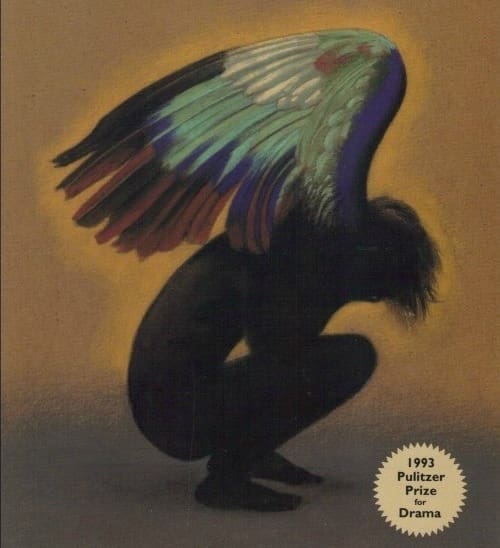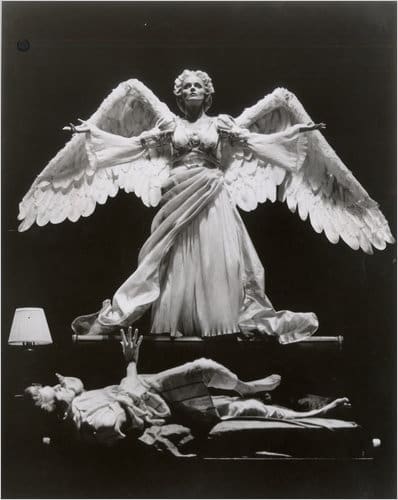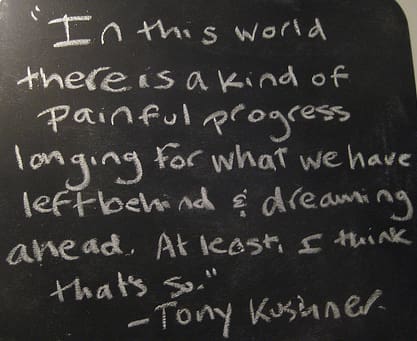 By Lauren Whalen
By Lauren Whalen
When I was 18, I did an art project against my will.
As a theatre major at Loyola University Chicago, I was required to take Introduction to Theatrical Design. Early in the semester, we had to create a conceptual project based on a favorite play. No rules. Just do it.
After 13 years of Catholic school, where structure was the air we breathed, I was at a loss. I couldn’t even draw a straight line.
The previous semester, I had been assigned Tony Kushner’s Angels in America. From the moment I sat down to read the play, on a bench facing Lake Michigan on a mild November day, I’d fallen in love with it. But even though I’d written a paper about the play, I still couldn’t express exactly why I loved it.
Time was running out. I did what I could. On critique day, I dreaded my fate — which would be delivered out loud to the entire class.
My teacher Daniel Ostling, a well-known set designer, circled the room until he came to my project. I held my breath in anticipation of the verbal smackdown sure to come.
Our names weren’t on the projects, only numbers. Dan picked mine up and looked out at the 30 or so performers and designers.
“Wow,” he said.
What?
My shocked face was a dead giveaway, so I hid behind a taller classmate and listened.
“Angels in America,” Dan said, still holding my project. “I walked up to this and thought, okay, cloud, celestial, whatever.”
I’d taken a cardboard jewelry box, covered it with fluffed-out cotton balls, adding a red stripe to symbolize the struggle with AIDS several of the characters faced.
“And then I turned it over,” Dan continued, “and listen to this.”
Clunk.
He’d found the rock I’d placed inside the box. Dan turned it over again. Clunk. The room was quiet. A classmate moved in to get a closer look.
 “It made me rethink everything,” Dan told us. “I wanted to hold this, to protect it. I thought of what the characters in the play face: the delicacy of life. It’s precious. Not to be wasted. You think it’s one thing, and then it goes…” Clunk.
“It made me rethink everything,” Dan told us. “I wanted to hold this, to protect it. I thought of what the characters in the play face: the delicacy of life. It’s precious. Not to be wasted. You think it’s one thing, and then it goes…” Clunk.
This is why Daniel Ostling has a Tony nomination and I don’t.
Intentionally or no, he perfectly summed up what I didn’t realize when I put the project together, why I loved Angels in America as an 18-year-old theatre major, and why I love it still.
Clunk.
Angels in America is seven hours long. Part One is a political drama, Part Two a divine comedy. The characters fight, screw, lust and collide, entering and exiting each other’s fantasies, hallucinations, flashbacks and flash- forwards while speaking a poetic tongue to which real-life humans can only aspire. It’s profane, searing, judgmental and hilarious — often within the same scene. It absolutely should not work. But it does.
Because Angels in America is the play that goes clunk.
The characters don’t speak like real people, but they certainly think and feel like them. They are a messy bunch: confused Mormons, corrupt attorneys, imaginative pill-popping housewives. A drag queen turned nurse is the sole voice of reason; a spurned gay man dying of AIDS the unlikely prophet.
Presiding over the action is the Angel, with “magnificent steel gray wings” (per Kushner’s stage directions), strongly sexual with a dry, barking cough: a far cry from the stained-glass creatures I was surrounded with growing up.
I was fresh out of a small farm town, brand new to the big city. I’d been taught that God made Adam for Eve, not Steve, Planned Parenthood was evil and anyone with AIDS deserved a grisly fate.
Once I read Angels in America, sitting on that bench overlooking Lake Michigan, I started to rethink everything. Even before I put the rock in the box, I heard the clunk — a wake-up call.
That was 13 years ago. Now instead of acting in plays, I review them. I also work for an organization that helps HIV-positive pregnant women.
Recently, I reread Angels in America. I was struck all over again by the beauty of Kushner’s language, the unexpected laughter rising out of the darkest moments, the call to action to fight injustices still plaguing our nation in 2012: the stigmas of homosexuality and HIV/AIDS, the inadequacy of health care, the fear to be who we are and do what we feel.
And after I read the last powerful line — “The Great Work Begins” — I heard it again.
Clunk.
Lauren Whalen is development and media coordinator for Pediatric AIDS Chicago Prevention Initiative (PACPI), a partner of the AIDS Foundation of Chicago. Her writing can be found on The Huffington Post, Chicago Theater Beat, The Film Yap and RedEye ‘Hoods. She still can’t draw a straight line.
Tony Kushner will be the guest of honor at the AIDS Foundation of Chicago’s 2012 fundraising dinner, An Angel Among Us: A Evening with Pulitzer Prize-winning Playwright Tony Kushner, on March 27. Tickets can be purchased online or by calling Rhett Lindsay, AFC’s manager of fundraiser events, at (312) 334-0935.
The Court Theatre’s preview performances of Angels in America begins March 30. Proceeds from the April 14 opening night performance go to AFC.



